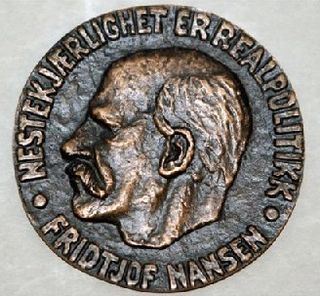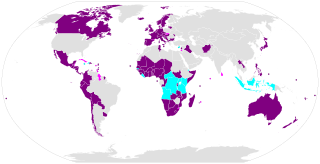Related Research Articles

The United Nations High Commissioner for Refugees (UNHCR) is a United Nations agency mandated to aid and protect refugees, forcibly displaced communities, and stateless people, and to assist in their voluntary repatriation, local integration or resettlement to a third country. It is headquartered in Geneva, Switzerland, with over 17,300 staff working in 135 countries.

A cluster munition is a form of air-dropped or ground-launched explosive weapon that releases or ejects smaller submunitions. Commonly, this is a cluster bomb that ejects explosive bomblets that are designed to kill personnel and destroy vehicles. Other cluster munitions are designed to destroy runways or electric power transmission lines, disperse chemical or biological weapons, or to scatter land mines. Some submunition-based weapons can disperse non-munitions, such as leaflets.

The HALO Trust is a non-political and non-religious registered British charity and American non-profit organization which removes debris left behind by war, in particular land mines. With over 10,000 staff worldwide, HALO has operations in 28 countries. Its largest operation is in Afghanistan, where the organization continues to operate under the Taliban regime that took power in August 2021.

Unexploded ordnance, unexploded bombs (UXBs), and explosive remnants of war are explosive weapons that did not explode when they were employed and still pose a risk of detonation, sometimes many decades after they were used or discarded. UXO does not always originate from wars; areas such as military training grounds can also hold significant numbers, even after the area has been abandoned. UXO from World War I continue to be a hazard, with poisonous gas filled munitions still a problem. When unwanted munitions are found, they are sometimes destroyed in controlled explosions, but accidental detonation of even very old explosives also occurs, sometimes with fatal results.

The Qana massacre took place on April 18, 1996, near Qana, a village in Southern Lebanon, when the Israel Defense Forces fired artillery shells at a United Nations compound. The artillery barrage had been launched to cover an Israeli special forces unit after it had come under mortar fire launched from the vicinity of the compound and radioed a request for support. Of 800 Lebanese civilians who had taken refuge in the compound, 106 were killed and around 116 injured. Four Fijian United Nations Interim Force in Lebanon soldiers were also seriously injured.

The 1978 South Lebanon conflict began after Israel invaded southern Lebanon up to the Litani River in March 1978, in response to the Coastal Road massacre near Tel Aviv by Lebanon-based Palestinian militants. The conflict resulted in the deaths of 1,100–2,000 Lebanese and Palestinians, 20 Israelis, and the internal displacement of 100,000 to 250,000 people in Lebanon. The Israel Defense Forces gained a military victory against the Palestine Liberation Organization as the latter was forced to withdraw from southern Lebanon, preventing it from launching attacks on Israel from across its land border with Lebanon. In response to the outbreak of hostilities, the United Nations Security Council adopted Resolution 425 and Resolution 426 on 19 March 1978, which called on Israel to immediately withdraw its troops from Lebanon and established the United Nations Interim Force in Lebanon (UNIFIL).

The Nansen Refugee Award is awarded annually by the United Nations High Commissioner for Refugees (UNHCR) to an individual, group, or organization in recognition of outstanding service to the cause of refugees, displaced or stateless people. It was established in 1954; Eleanor Roosevelt was the inaugural awardee. The award is named after Nobel Peace Prize laureate, explorer, and League of Nations High Commissioner for Refugees, Fridtjof Nansen.
A mine clearance organization, or demining organization, is an organization involved in the removal of landmines and unexploded ordnance (UXO) for military, humanitarian, or commercial reasons. Demining includes mine clearance, as well as surveying, mapping and marking of hazardous areas.
The Geneva International Centre for Humanitarian Demining is an international organisation working in mine action and explosive ordnance risk reduction, with a focus on landmines, cluster munitions and ammunition stockpiles. Based in the Maison de la paix in Geneva, it is legally a non-profit foundation in Switzerland.

The 2006 Lebanon War, also called the 2006 Israel–Hezbollah War and known in Lebanon as the July War and in Israel as the Second Lebanon War, was a 34-day military conflict in Lebanon, Northern Israel and the Golan Heights. The principal parties were Hezbollah paramilitary forces and the Israel Defense Forces (IDF). The conflict started on 12 July 2006, and continued until a United Nations-brokered ceasefire went into effect in the morning on 14 August 2006, though it formally ended on 8 September 2006 when Israel lifted its naval blockade of Lebanon. Due to unprecedented Iranian military support to Hezbollah before and during the war, some consider it the first round of the Iran–Israel proxy conflict, rather than a continuation of the Arab–Israeli conflict.
United Nations Security Council Resolution 1701 is a resolution that was intended to resolve the 2006 Lebanon War.
Allegations of war crimes in the 2006 Lebanon War refer to claims of various groups and individuals, including Amnesty International, Human Rights Watch, and United Nations officials, who accused both Hezbollah and Israel of violating international humanitarian law during the 2006 Lebanon War, and warned of possible war crimes. These allegations included intentional attacks on civilian populations or infrastructure, disproportionate or indiscriminate attacks, the use of human shields, and the use of prohibited weapons.
Mine action is a combination of humanitarian aid and development studies that aims to remove landmines and reduce the social, economic and environmental impact of them and the explosive remnants of war (ERW).

The Convention on Cluster Munitions (CCM) is an international treaty that prohibits all use, transfer, production, and stockpiling of cluster bombs, a type of explosive weapon which scatters submunitions ("bomblets") over an area. Additionally, the convention establishes a framework to support victim assistance, clearance of contaminated sites, risk reduction education, and stockpile destruction. The convention was adopted on 30 May 2008 in Dublin, and was opened for signature on 3 December 2008 in Oslo. It entered into force on 1 August 2010, six months after it was ratified by 30 states. As of February 2022, a total of 123 states are committed to the goal of the convention, with 110 states that have ratified it, and 13 states that have signed the convention but not yet ratified it.

The Mines Advisory Group (MAG) is a non-governmental organization that assists people affected by landmines, unexploded ordnance, and small arms and light weapons.

The United Nations Mine Action Service (UNMAS) is a service located within the United Nations Department of Peacekeeping Operations that specializes in coordinating and implementing activities to limit the threat posed by mines, explosive remnants of war and improvised explosive devices.
INTERSOS is a non-profit humanitarian aid organization that works to assist victims of natural disaster and armed conflict. INTERSOS has operated as an independent organization since its foundation in 1992. A Mine Action Unit was established within INTERSOS to deal specifically with the mine danger and its effects through mine awareness, victims assistance and mine clearance operations.

The United Nations Special Service Medal (UNSSM) is presented to personnel with 90 days of service with a United Nations mission not covered by a specific United Nations Medal. United Nations Headquarters service is not eligible.
Legacies of War, is a fiscally sponsored project of NEO Philanthropy, Inc (NEO), dedicated to raising awareness about the history of the Vietnam War-era bombing in Laos and advocate for the clearance of unexploded bombs, (UXO) and survivor assistance, to provide space for healing the wounds of war, and to create greater hope for a future of peace.

ITF Enhancing Human Security is a humanitarian, non-profit organization founded by the Republic of Slovenia., which specializes in land mine clearance and post-conflict reconstruction. It was established on 12 March 1998 with the purpose of helping Bosnia and Herzegovina in its post-conflict rehabilitation, specifically with mine clearance and assistance to mine victims.
References
- ↑ 2008 Nansen Refugee Award to Mine Action Programme in southern Lebanon, UNHCR press release
- ↑ UN workers scour Lebanon for bombs Archived 5 January 2016 at the Wayback Machine , The National
- ↑ The Impact of Israel’s Use of Cluster Munitions in Lebanon in July and August 2006, Human Rights Watch
- ↑ Making Southern Lebanon Safe Again for Returnees, Rebuild Lebanon, Lebanese Government
- ↑ Award-winning UN de-miner wants to donate his prize money to community project, The Daily Star